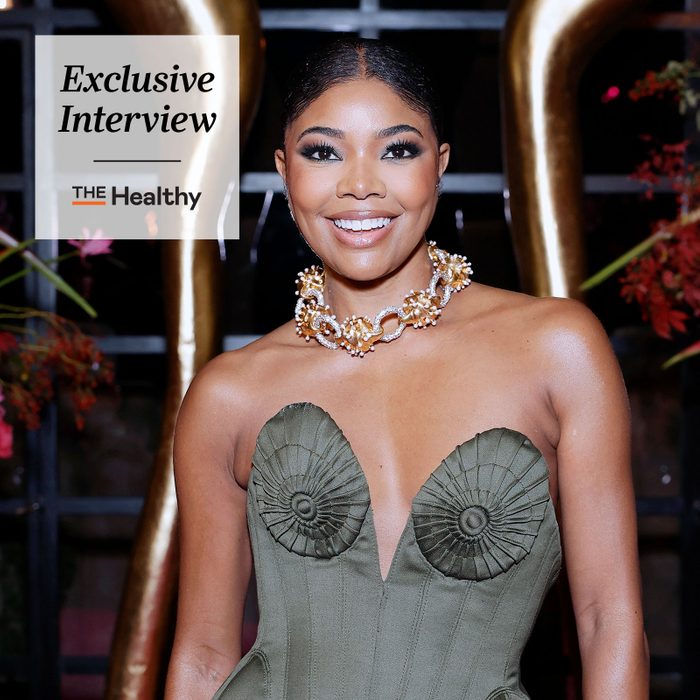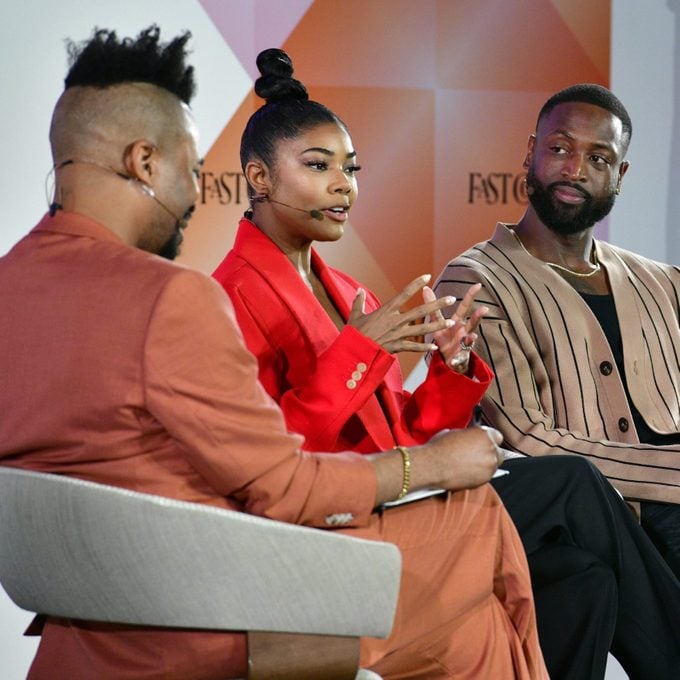Gabrielle Union Gets Candid About Menopause: “I Feel Like Radical Transparency Has Really Helped”
Updated: Nov. 16, 2023

After losing a friend during a depression "danger zone," the actress, 51, is helping to bring a formerly taboo topic front-and-center.
It seems long overdue for menopause to become a normal topic of discussion, especially considering that it affects greater than 50% of the population. But for a long time, menopause was off-limits in an often ageist society where women are still navigating social and professional equity. So instead, women experienced the variety of symptoms menopause can cause—sweats, brain fog, insomnia, major changes in sleep patterns, mood fluctuations, and much more—in private.
Today, high-profile figures are opening up about their personal experiences with menopause in the hopes that it will encourage more women to be vocal with their questions about managing this phase of life that arguably should celebrate wisdom, confidence, and natural beauty with greater authority.
This week, Gabrielle Union has been the latest celebrity to talk about her experience. The actress, mom, and wife of retired NBA star Dwyane Wade (another friend of The Healthy @Reader’s Digest!) has partnered with Clearblue, the brand classically known for their pregnancy tests. Clearblue has launched the Clearblue Menopause Stage Indicator—an innovative product which they report is the only one that combines a woman’s urine follicle-stimulating hormone [FSH] measurements with her age and cycle history to indicate her likely menopause stage. (We love science!)
With information comes power: Gabrielle spoke with The Healthy @Readers Digest to help get women talking about “the change” that generations before us politely kept under-the-radar.

The Healthy @Reader’s Digest: We love that you’re here to talk about menopause—we need to be having this conversation! How has it been for you?
Gabrielle Union: Well, it’s been long. The first time I did a full blood panel, one of the things that they revealed was that my FSH level was in the perimenopausal zone. At the time it didn’t really mean that much. I was like, I’m not old. I don’t what you’re talking about. I was just dancing on tables at the club!
It didn’t really start to affect my life until I started my fertility journey. And probably by my mid-forties, the symptoms: The hot flashes, the insomnia, the hair loss, the hair gain in places you don’t need it, the anxiety—I have anxiety as a rape survivor, I have PTSD—but it just felt more like terror instead of my usual anxiety.
And I just started feeling sad, and I’ve never had a history of depression or anything like that. So those things were like, OK, wait, something is going on. The brain fog, even trying to talk to the doctor, everything just sort of would blank out. So that’s when I really needed help.
I Tried It: How Trauma-Informed Dance Therapy Helped Me Love My Body Again
The Healthy: What did you find helpful?
Gabrielle Union: I reached out to a woman named Alisa Vitti, who’s a hormone specialist, and she suggested I try an anti-inflammatory diet: No gluten, no dairy, no alcohol, no caffeine. And by the end of the three weeks, everything had kind of subsided.
I’ve been on that same diet since. It’s been seven, eight years now. And sometimes things flare up because I go on vacation and I feel like [the rules don’t] really count if you’re in Europe. [Laughs] And then immediately the hot flashes, it’s always the hot flashes first, come back with a vengeance. So it just kind of reminds me to get back on track.
The hair loss part has been an ongoing challenge, and some other health issues impact that as well. So it’s been a journey. And luckily I have friends who are all around my age and talking about things and offering suggestions, and community who also were able to clock my changes in mood when sometimes you just sort of disassociate when you start to feel yourself sort of falling.
I feel like radical transparency has really helped because at least people know what I’m going through, and it created this space for empathy and grace.
The Healthy: That’s wonderful. How old were you when you did the blood test to find out?
Gabrielle Union: Thirty-seven, but I wasn’t testing for that, I felt like something was off medically. So they ran every test—which I thought I was already getting when I [went in for] blood tests, but they’re only testing for whatever the doctor is asking for. So to say, “I want a full blood panel where you test everything,” I didn’t know that was a thing.
The Healthy: That’s helpful for women to hear. What else have you found helpful in terms of supplements or diet or mental health?
Gabrielle Union: Luckily I’ve been seeing the same therapist for 25 years and she’s a Black woman, she’s also gone through menopause, and so she could kind of clock the changes, even the ones I wasn’t really noticing. She made suggestions that had worked for her that I tried to apply to my life, like exercise. But sometimes when you’re dealing with the blues or depression or whatever you want to call your sadness, you just don’t have the energy.
5 Ways Menopause Changes Your Skin (with Solutions!), from a Cosmetic Surgeon
The Healthy: Of course.
Gabrielle Union: You don’t have the energy, and it can just get dark. One of our friends in our group took her life, and it just kind of got me down the rabbit hole of learning about women between 45 and 55. That is our danger zone. That is the age when most women who do commit suicide do it.
And I was like, I know it’s not a coincidence that that’s the age range. We are going through this massive hormonal shift where we’re also trying to get pushed out of our jobs. We’re also [going through] changes in home life, [like] you become an empty nester relationship, health challenges—it can all kind of be around that same time where everything just feels like it’s your fault. You are defective, something you are doing is not right. And when that is the prevailing attitude due to patriarchy and misogyny and all the things, you blame yourself when you’re already in a spiral.
And women, we are so easily dismissed as, Oh my God, she’s just a b*tch. She’s just dramatic. Oh my God, nothing is ever right. She’s impossible.
But it’s so dismissive and it’s gaslighting when you realize you’re like, This isn’t me. I don’t really know what’s happening. I don’t know why I just lost it. Please believe that this isn’t me. But for the people who are kind of on the receiving end, if nobody knows what’s going on, it can just add to the wanting to isolate or being isolated.
No two people’s menopausal journey is the same, but we can all listen and we can share resources and we can give each other tips for how to get into the doctor, give them all the information so they’re not just responding to one symptom. They’re looking at it holistically, completely.
The Healthy: It’s important to look at health care through that holistic lens, along with the more Western clinical lens.
Gabrielle Union: When Clearblue reached out and I learned about the at-home FSH tests and the app—the app was what really, really fascinated me because it allows you to log your period, the date of your period, which is obviously important. But also what was happening in that period: Was it extremely heavy? Were there clots? Because as you get older, you’ll be like, That was a golf ball. And you can document all of the things that you are experiencing.

When Does Menopause Start—and When Will It Start for You?
The Healthy: Is it kind of like finding out you’re pregnant with a pregnancy test, but then you still go to verify it with your doctor? You’re in this menopause stage, but then you go and verify it?
Gabrielle Union: Yes! It’s information that you use to help advocate for yourself. Ideally you do them every-other day and it’ll give you the various readings coupled with your age, your cycle history, and they can give you an idea of what stage of perimenopause menopause you are in.
But you have to have it confirmed by a healthcare professional. And ideally that’s when you’ll say, “Can I get a full blood panel?” Because if you have autoimmune issues, if you have thyroid issues, if you have PCOS or endometriosis, all of these things can impact your menopausal journey. So you want to have as much information as you can.
The Healthy: How has your husband been supportive as you’re going through this, and what would be helpful for men to know in terms of how to support their partners through this?
Gabrielle Union: I think for me it was just being completely honest about what I was experiencing so he can be prepared that if I snap at him, it’s not personal and that This is what I’m going through. These are some of the things that I could experience, and I absolutely hate that this would have any kind of negative impact on you or my family, but I’m absolutely going to need your support and your grace and understanding while I figure out how to navigate all of this. The more I shared with him, the more empathetic he was, the more he could help with the family. Like, OK let’s give Mommy a beat. Let’s give her some time. Or if I was just in a blue state, he would just be like, “Yep, stay in bed. It’s OK.”
View this post on Instagram
The Healthy: That’s so awesome. You celebrated your 51st birthday recently, and you glowed. What are you loving about getting older?
Gabrielle Union: I think for me it’s clarity. Just feeling clear about a lot of things. I’m not quite as confused and I just don’t have the same attachment to outside validation.
The Healthy: Tell us the self-care routine you never skip.
Gabrielle Union: Therapy.















